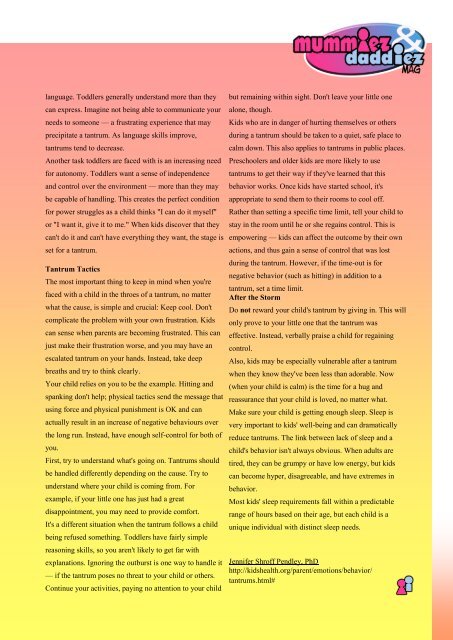You also want an ePaper? Increase the reach of your titles
YUMPU automatically turns print PDFs into web optimized ePapers that Google loves.
language. Toddlers generally understand more than they<br />
can express. Imagine not being able to communicate your<br />
needs to someone — a frustrating experience that may<br />
precipitate a tantrum. As language skills improve,<br />
tantrums tend to decrease.<br />
Another task toddlers are faced with is an increasing need<br />
for autonomy. Toddlers want a sense of independence<br />
and control over the environment — more than they may<br />
be capable of handling. This creates the perfect condition<br />
for power struggles as a child thinks "I can do it myself"<br />
or "I want it, give it to me." When kids discover that they<br />
can't do it and can't have everything they want, the stage is<br />
set for a tantrum.<br />
Tantrum Tactics<br />
The most important thing to keep in mind when you're<br />
faced with a child in the throes of a tantrum, no matter<br />
what the cause, is simple and crucial: Keep cool. Don't<br />
complicate the problem with your own frustration. Kids<br />
can sense when parents are becoming frustrated. This can<br />
just make their frustration worse, and you may have an<br />
escalated tantrum on your hands. Instead, take deep<br />
breaths and try to think clearly.<br />
Your child relies on you to be the example. Hitting and<br />
spanking don't help; physical tactics send the message that<br />
using force and physical punishment is OK and can<br />
actually result in an increase of negative behaviours over<br />
the long run. Instead, have enough self-control for both of<br />
you.<br />
First, try to understand what's going on. Tantrums should<br />
be handled differently depending on the cause. Try to<br />
understand where your child is coming from. For<br />
example, if your little one has just had a great<br />
disappointment, you may need to provide comfort.<br />
It's a different situation when the tantrum follows a child<br />
being refused something. Toddlers have fairly simple<br />
reasoning skills, so you aren't likely to get far with<br />
explanations. Ignoring the outburst is one way to handle it<br />
— if the tantrum poses no threat to your child or others.<br />
Continue your activities, paying no attention to your child<br />
but remaining within sight. Don't leave your little one<br />
alone, though.<br />
Kids who are in danger of hurting themselves or others<br />
during a tantrum should be taken to a quiet, safe place to<br />
calm down. This also applies to tantrums in public places.<br />
Preschoolers and older kids are more likely to use<br />
tantrums to get their way if they've learned that this<br />
behavior works. Once kids have started school, it's<br />
appropriate to send them to their rooms to cool off.<br />
Rather than setting a specific time limit, tell your child to<br />
stay in the room until he or she regains control. This is<br />
empowering — kids can affect the outcome by their own<br />
actions, and thus gain a sense of control that was lost<br />
during the tantrum. However, if the time-out is for<br />
negative behavior (such as hitting) in addition to a<br />
tantrum, set a time limit.<br />
After the Storm<br />
Do not reward your child's tantrum by giving in. This will<br />
only prove to your little one that the tantrum was<br />
effective. Instead, verbally praise a child for regaining<br />
control.<br />
Also, kids may be especially vulnerable after a tantrum<br />
when they know they've been less than adorable. Now<br />
(when your child is calm) is the time for a hug and<br />
reassurance that your child is loved, no matter what.<br />
Make sure your child is getting enough sleep. Sleep is<br />
very important to kids' well-being and can dramatically<br />
reduce tantrums. The link between lack of sleep and a<br />
child's behavior isn't always obvious. When adults are<br />
tired, they can be grumpy or have low energy, but kids<br />
can become hyper, disagreeable, and have extremes in<br />
behavior.<br />
Most kids' sleep requirements fall within a predictable<br />
range of hours based on their age, but each child is a<br />
unique individual with distinct sleep needs.<br />
Jennifer Shroff Pendley, PhD<br />
http://kidshealth.org/parent/emotions/behavior/<br />
tantrums.html#






